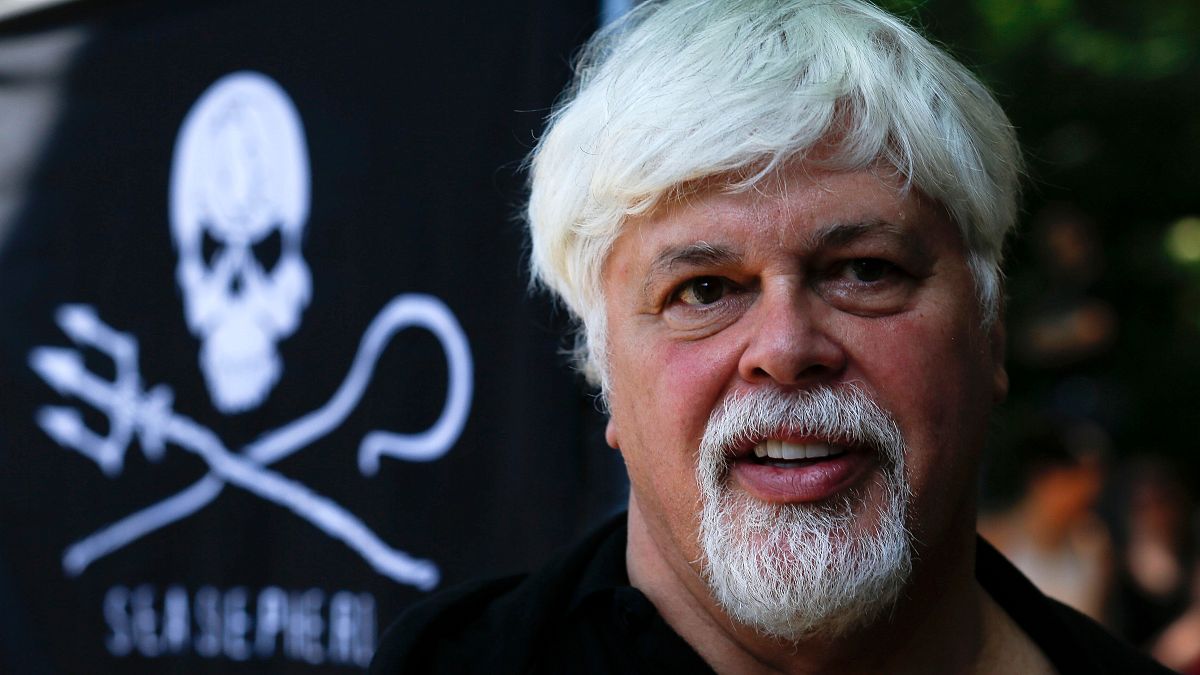The Sea Shepherd founder has been in custody in Denmark since he was arrested in Greenland in July.
Paul Watson, the founder of marine conservation group Sea Shepherd is facing extradition from Denmark to Japan, where he could be sentenced to up to 15 years in prison for an alleged attack on a whaling vessel 12 years ago.
Sea Shepherd France told journalists they had delivered a letter from the notorious anti-whaling activist to French President Emmanuel Macron.
The group’s president in France, Lamya Essemlali, said the 73-year old Canadian-American “wrote a letter in prison, which he gave to me, and it has been presented to the president through his counsellors”.
Watson is known for leading a decades-long campaign of direct action against Japanese whaling, a campaign that has often involved disruptive attacks on whaling vessels.
A French resident, he was apprehended in Greenland this July while docking for fuel during a mission to intercept a Japanese whaling ship in the northern Pacific Ocean.
Danish authorities are now reviewing Japan’s request for his extradition. If Watson is convicted in Japan, he faces up to 15 years in prison.
While the French president’s team has not yet responded to Watson’s letter, when the situation erupted in July, the Elysée Palace stated that Macron was “following the situation closely” and “intervening with the Danish authorities.”
Japan’s red notice and two dead dolphins
The arrest was made under a Red Notice first issued by Interpol on Japan’s behalf in 2012. It accuses Watson of causing damage to a whaling ship that year, and of injuring a crew member with a stink bomb.
In September, European Parliament delegates demanded his release at a protest in front of the Danish embassy in Brussels.
Critics of Watson’s arrest in Greenland say it is part of a politically motivated effort to sanitise Japan’s whaling practices, which are banned internationally under a 1986 moratorium on commercial whaling.
Japan both claims whaling is part of its cultural heritage and insists that its programme, which takes hundreds of whales a year, is purely scientific in purpose.
In the past, international authorities paid little attention to Watson’s activities. But according to Jean Tamalet, a lawyer associated with Sea Shepherd France, “that has obviously changed”.
Tamalet emphasised that the call for political asylum is not just a plea to prevent Watson’s extradition, but part of a strategy to secure his release.
Sea Shepherd has also made headlines in the past for what many view as more controversial actions. In 2020, the organisation brought two dead dolphins to Paris to draw attention to the accidental killing of some 11,300 dolphins the previous winter in the Bay of Biscay.
Supporters and sceptics
Watson has attracted significant support in France since he moved to the country in 2015, with rallies demanding his release held across the country in early September.
French actress-turned-animal rights activist Brigitte Bardot has voiced her backing for Watson, as has Hollywood’s Pierce Brosnan, who in an Instagram post quoted Watson’s signature maxim: “If our oceans die, we die.”
Watson’s colleagues and entourage have also spoken out about what they qualify as false claims being circulated about his beliefs.
In a statement posted on Sea Shepherd’s website, Essemlali wrote that some had “refused our invitation to the 4 September rally on the Place de la République in Paris on the grounds that Paul was a ‘eugenicist’, ‘misogynist’ or ‘Malthusian'”.
She added that they had also “ignored the grotesque accusations made by anonymous individuals or groups such as ‘enragés’ or ‘antifas’ who don’t know Paul.”
Additional sources • Associated press

